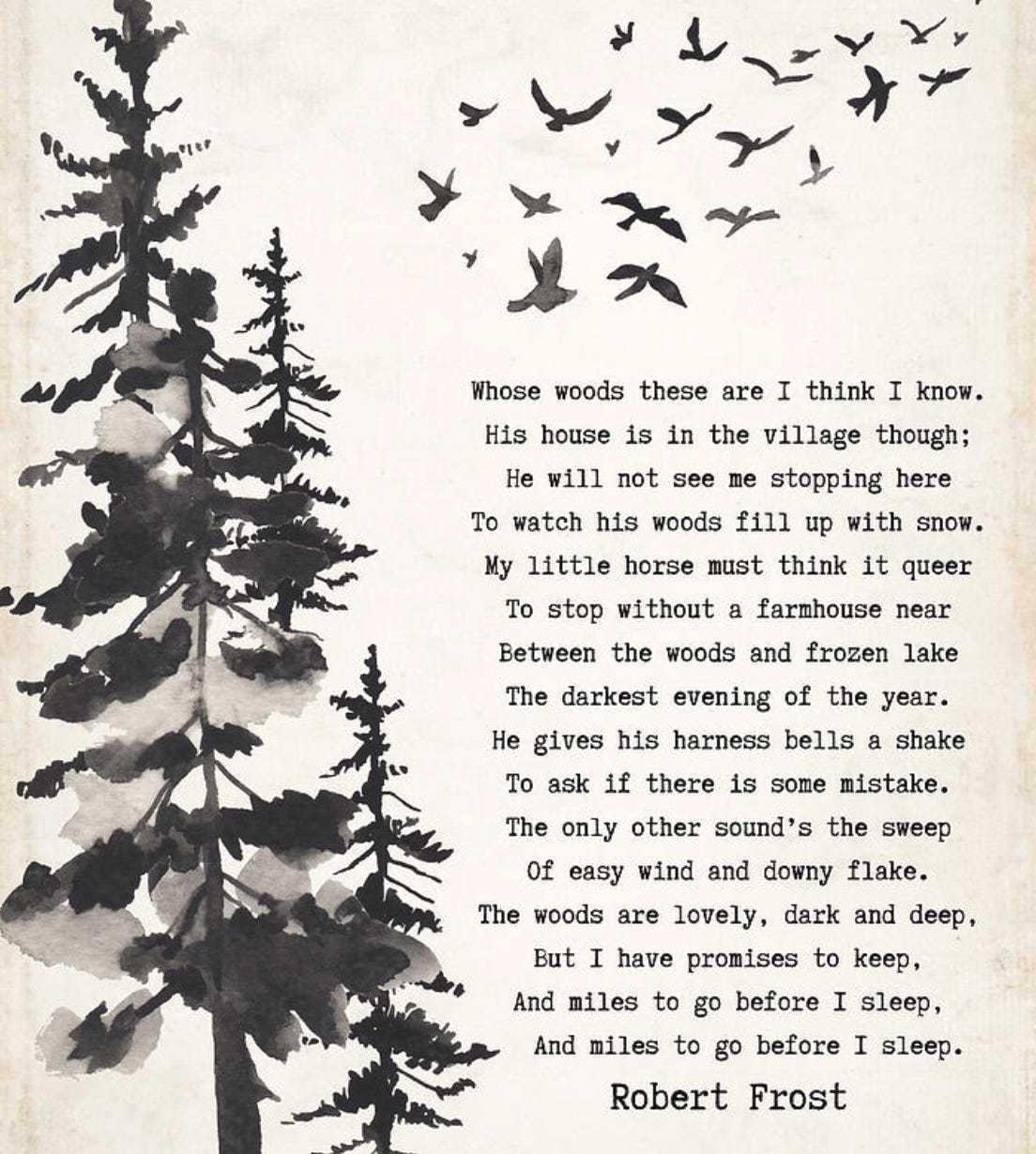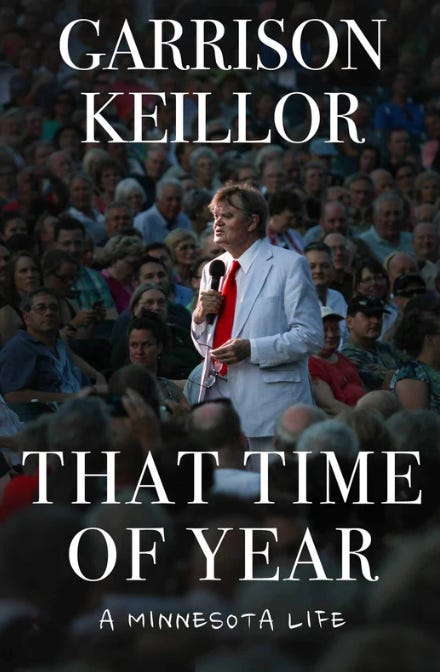“A World of Singers” by Ralph Stevens from At Bunker Cove. © Moon Pie Press, 2017.
ORIGINAL TEXT AND AUDIO - 2017
Robert Frost’s poem “Stopping by Woods on a Snowy Evening” was published in The New Republic magazine on this day in 1923. He called it, “My best bid for remembrance.” It is one of the best known and loved poems in all of American literature.
Right before he wrote it, Frost stayed up all night working on a different poem called “New Hampshire.” He’d never worked all night on a poem before, and he was feeling pretty good about that, and so he went outside to watch the sun rise. It was the middle of June and there was no snow in sight.
He suddenly got an idea there, and rushed back in and wrote “Stopping by Woods on a Snowy Evening,” almost without lifting his pen from the page. He said of the experience, “It was as if I’d had a hallucination.”
Frost said poetry could make you “remember what you didn’t know you knew.”
“Stopping by Woods on a Snowy Evening” ends:
The woods are lovely, dark, and deep.
But I have promises to keep,
And miles to go before I sleep,
And miles to go before I sleep.
On this date in 1994, the Supreme Court ruled that parodies do not require the permission of the original copyright holder. The case had its origins in the “fair use doctrine,” which is a limited legal exception to a creator’s control over his or her copyrighted work. Traditional examples of fair use of copyright-protected work include commentary, criticism, parody, news reporting, educational purposes, and library archiving.
The fair use doctrine was originally spelled out in the 1976 Federal Copyright Act. The act lists four areas that should be considered when determining whether a copyright protection has been violated: the nature of the original work; how much of it is used; the character of the new work; and the impact it will have on the market for the original work.
The Supreme Court case that was decided on this day was Campbell v. Acuff-Rose Music, Inc. The rap group 2 Live Crew contacted Acuff-Rose Music because they wanted to write a parody of the Roy Orbison hit “Oh, Pretty Woman.” Acuff-Rose refused to grant permission, even though the band intended to pay for the rights. But 2 Live Crew went ahead with their parody, which they called “Pretty Woman.” They lifted the signature bass line directly from the Roy Orbison version. The song’s lyrics describe a future where the “pretty woman” of Orbison’s song is now a hairy-bodied, bald, two-timing woman. Nearly a year after the song was released, Acuff-Rose sued Luther Campbell, the leader of 2 Live Crew. The district court ruled in favor of Campbell, but Acuff-Rose appealed the decision, and the appeals court reversed the lower court’s decision, ruling in favor of the publisher because 2 Live Crew had used the copyrighted material for their own commercial gain, even though they credited the original songwriters and publisher. The case went to the Supreme Court, who ruled in favor of Luther Campbell.
Justice David Souter delivered the opinion of the court. He emphasized that every fair use case must be decided on a case-by-case basis, after looking carefully at all four factors described by the Federal Copyright Act. He wrote that a new work of parody must present “something new, with a further purpose or different character, alternating the first with new expression, meaning, or message.” The justices unanimously ruled that “Pretty Woman” met that standard. Souter wrote: “2 Live Crew juxtaposes the romantic musings of a man whose fantasy comes true, with degrading taunts, a bawdy demand for sex, and a sigh of relief from paternal responsibility. The later words can be taken as a comment on the naiveté of the original of an earlier day, as a rejection of its sentiment that ignores the ugliness of street life and the debasement that it signifies.”
Since 1994, the case has had huge implications for the internet. Without the Supreme Court’s ruling, search engines would be unable to display copyright-protected material in their search results. Parents would not be able to upload videos of their kids dancing to copyright-protected songs. And as a direct result of this ruling, Google even won the right to digitally scan entire books without the copyright holders’ permission — millions of books — for an online database in 2013.
On this day in 1876, a 29-year-old Scottish-born teacher and inventor named Alexander Graham Bell received a patent for what became known as “the telephone,” a device that would allow two people to speak over wires from separate locations.
Three days after filing his patent, Alexander Graham Bell sent the first successful message. He said, “Mr. Watson, come here; I need you.” Watson came running.
Alexander Graham Bell filed his patent two hours before another inventor, Elisha Gray, filed his patent for his own telephonic device. For years afterward, Gray would accuse Bell of stealing his idea. There were a total of 585 challenges to Bell’s patent over the years.
Soon enough, the idea caught on and became quite successful. The president of Western Union had originally turned down the opportunity to buy Bell’s patent for $100,000, thinking the telephone was merely a toy, so Alexander Graham Bell started the Bell Telephone Company himself, even though he found his invention annoying and refused to have a telephone installed in his home.
Alexander Graham Bell also worked on designs for airplanes, helicopters, kites, and an early version of the metal detector. He even filed a patent for a “photophone” in 1880, a wireless device in which the speakers could see each other as they talked. He said, “The day will come when the man at the telephone will be able to see the distant person to whom he is speaking.”
Be well, do good work, and keep in touch.®
RELEASE WEEK - March 7th That Time of Year: A Minnesota Life (slightly revised) Softcover






Thank you all....we love reading Garrison's stories and occasionally writing some comments like Siskel and Ebert. We get to have all the fun, and enjoy his captions, too.
When I was in college, back in the mid 1960's, the Men's Glee singing group, to which my then friend, ultimately husband belonged, sang a lovely setting by Randall Thompson of "Stopping by Woods on a Snowy Evening". Thanks for the memory.